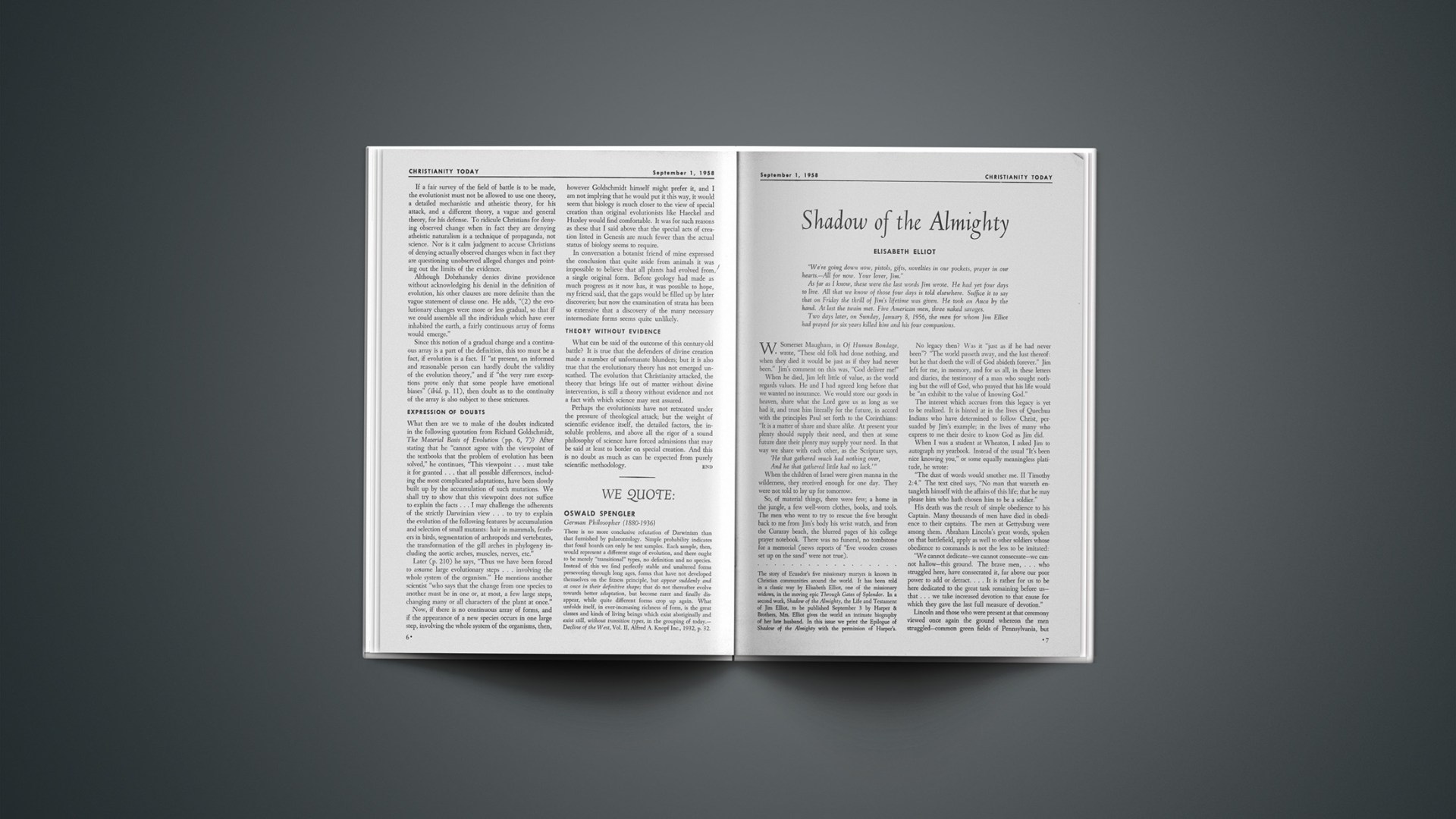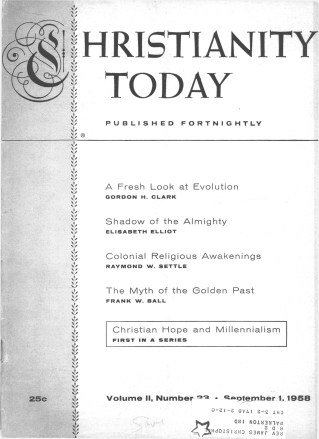“We’re going down now, pistols, gifts, novelties in our pockets, prayer in our hearts.—All for now. Your lover, Jim.”
As far as I know, these were the last words Jim wrote. He had yet four days to live. All that we know of those four days is told elsewhere. Suffice it to say that on Friday the thrill of Jim’s lifetime was given. He took an Auca by the hand. At last the twain met. Five American men, three naked savages.
Two days later, on Sunday, January 8, 1956, the men for whom Jim Elliot had prayed for six years killed him and his four companions.
w. Somerset Maugham, in Of Human Bondage, wrote, “These old folk had done nothing, and when they died it would be just as if they had never been.” Jim’s comment on this was, “God deliver me!” When he died, Jim left little of value, as the world regards values. He and I had agreed long before that we wanted no insurance. We would store our goods in heaven, share what the Lord gave us as long as we had it, and trust him literally for the future, in accord with the principles Paul set forth to the Corinthians: “It is a matter of share and share alike. At present your plenty should supply their need, and then at some future date their plenty may supply your need. In that way we share with each other, as the Scripture says,
‘He that gathered much had nothing over,
And he that gathered little had no lack.’ ”
When the children of Israel were given manna in the wilderness, they received enough for one day. They were not told to lay up for tomorrow.
So, of material things, there were few; a home in the jungle, a few well-worn clothes, books, and tools. The men who went to try to rescue the five brought back to me from Jim’s body his wrist watch, and from the Curaray beach, the blurred pages of his college prayer notebook. There was no funeral, no tombstone for a memorial (news reports of “five wooden crosses set up on the sand” were not true).
No legacy then? Was it “just as if he had never been”? “The world passeth away, and the lust thereof: but he that doeth the will of God abideth forever.” Jim left for me, in memory, and for us all, in these letters and diaries, the testimony of a man who sought nothing but the will of God, who prayed that his life would be “an exhibit to the value of knowing God.”
The interest which accrues from this legacy is yet to be realized. It is hinted at in the lives of Quechua Indians who have determined to follow Christ, persuaded by Jim’s example; in the lives of many who express to me their desire to know God as Jim did.
When I was a student at Wheaton, I asked Jim to autograph my yearbook. Instead of the usual “It’s been nice knowing you,” or some equally meaningless platitude, he wrote:
“The dust of words would smother me. 2 Timothy 2:4.” The text cited says, “No man that warreth entangleth himself with the affairs of this life; that he may please him who hath chosen him to be a soldier.”
His death was the result of simple obedience to his Captain. Many thousands of men have died in obedience to their captains. The men at Gettysburg were among them. Abraham Lincoln’s great words, spoken on that battlefield, apply as well to other soldiers whose obedience to commands is not the less to be imitated:
“We cannot dedicate—we cannot consecrate—we cannot hallow—this ground. The brave men, … who struggled here, have consecrated it, far above our poor power to add or detract.… It is rather for us to be here dedicated to the great task remaining before us—that … we take increased devotion to that cause for which they gave the last full measure of devotion.”
Lincoln and those who were present at that ceremony viewed once again the ground whereon the men struggled—common green fields of Pennsylvania, but fraught with new significance. As I read again Jim’s own words, put down in battered notebooks during the common routine of life, they become, for me, fraught with new meaning. To them I can add nothing.
“He is no fool who gives what he cannot keep to gain what he cannot lose.” (1949)
“One treasure, a single eye, and a sole master.” (1948)
“God, I pray Thee, light these idle sticks of my life and may I burn for Thee. Consume my life, my God, for it is Thine. I seek not a long life, but a full one, like you, Lord Jesus.” (1948)
“Father, take my life, yea, my blood if Thou wilt, and consume it with Thine enveloping fire. I would not save it, for it is not mine to save. Have it Lord, have it all. Pour out my life as an oblation for the world. Blood is only of value as it flows before Thine altar.” (1948)
“Saturate me with the oil of the Spirit that I may be aflame. But flame is often short-lived. Canst thou bear this, my soul? Short life? In me there dwells the spirit of the Great Short-Lived, whose zeal for God’s house consumed Him. ‘Make me Thy fuel, Flame of God.’ ” (1948)
“Are we willing to build with a trowel in one hand, while the other grasps a sword?” (1948)
“Taking all, Thou givest full measure of Thyself,
With all things else eternal,
Things unlike the mouldy pelf by earth possessed.”
“Father, if Thou wilt let me go to South America to labor with Thee and to die, I pray that Thou wilt let me go soon. Nevertheless, not my will.” (1948) “How few, how short these hours my heart must beat—then on into the real world where the unseen becomes important.” (1948)
Of the coffin: “A swallowing up by Life. For this I am most anxious.” (1948)
“Ah, how many Marahs have been sweetened by a simple, satisfying glimpse of the Tree and the Love which underwent its worst conflict there. Yet, the Cross is the tree that sweetens the waters. (1949)
“As your life is in His hands, so are the days of your life. But don’t let the sands of time get into the eye of your vision to reach those who sit in darkness. They simply must hear. Wives, houses, practices, education, must learn to be disciplined by this rule: ‘Let the dead attend to the affairs of the already dead, go thou and attend the affairs of the dying.’ ”(1948)
“Overcome anything in the confidence of your union with Him, so that contemplating trial, enduring persecution or loneliness, you may know the blessedness of the ‘joy set before,’ for ‘We are … the sheep of his pasture. Enter into his gates with thanksgiving, and into his courts with praise.’ And what are sheep doing going into the gate? What is their purpose inside those courts? To bleat melodies and enjoy the company of the flock? No. Those sheep were headed for the altar. Their pasture feeding had been for one purpose: to test them and fatten them for bloody sacrifice. Give Him thanks, then, that you have been counted worthy of His altars. Enter into the work with praise.” (1949)
To his mother when his brother Bert sailed for Peru:
“Remember—and I don’t mean to sound pedantic or impudent as if I knew all the costs—remember that we have bargained with Him who bore a Cross, and in His ministry to those disciples His emphasis was upon sacrifice, not of worldly goods so much as upon family ties. Let nothing turn us from the truth that God has determined that we become strong under fire, after the pattern of the Son. Nothing else will do.
‘O Prince of Glory, who dost bring
Thy sons to glory through the Cross,
Let us not shrink from suffering,
Reproach or loss.’ ” (1949)
“I must not think it strange if God takes in youth those whom I would have kept on earth till they were older. God is peopling Eternity, and I must not restrict Him to old men and women.” (1950)
“Granted, fate and tragedy, aimlessness and just-missing-by-a-hair are part of human experience, but they are not all, and I’m not sure they are a major part, even in the lives of men who know no Designer or design. For me, I have seen a Keener Force yet, the force of Ultimate Good working through seemed ill. Not that there is rosiness, ever; there is genuine ill, struggle, dark-handed, unreasoning fate, mistakes, ‘if-onlys’ and all the Hardyisms you can muster. But in them, I am beginning to discover a Plan greater than any could imagine.” (1951)
“The principle of getting by spending is illustrated by the actions of God:
‘He had yet one, a beloved Son,’
‘He giveth not the Spirit by measure.’
‘He spared not His own Son.’
‘He emptied Himself.’
“Only I know that my own life is full. It is time to die, for I have had all that a young man can have, at least all that this young man can have. I am ready to meet Jesus.” (December, 1951)
“Gave myself for Auca work more definitely than ever, asking for spiritual valor, plain and miraculous guidance.…” (May, 1952)
“Give me a faith that will take sufficient quiver out of me so that I may sing. Over the Aucas, Father, I want to sing!” (July, 1952)
“I know that my hopes and plans for myself could not be any better than He has arranged and fulfilled them. Thus may we all find it, and know the truth of the word which says, ‘He will be our guide even unto death.’ ”
The story of Ecuador’s five missionary martyrs is known in Christian communities around the world. It has been told in a classic way by Elisabeth Elliot, one of the missionary widows, in the moving epic Through Gates of Splendor. In a second work, Shadow of the Almighty, the Life and Testament of Jim Elliot, to be published September 3 by Harper & Brothers, Mrs. Elliot gives the world an intimate biography of her late husband. In this issue we print the Epilogue of Shadow of the Almighty with the permission of Harper’s.










